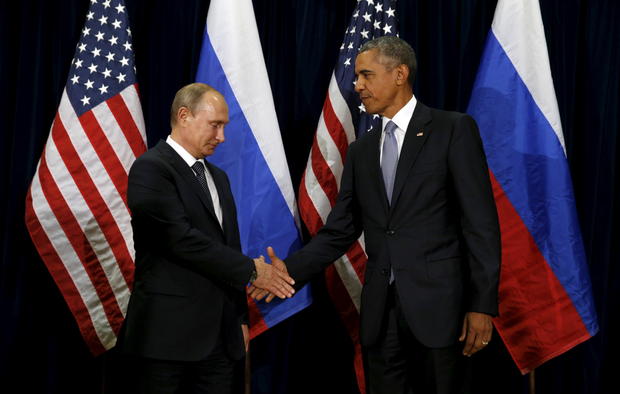Obama, Putin clash over differences on Syria's future
UNITED NATIONS - U.S. President Barack Obama and Russian President Vladimir Putin sharply disagreed Monday over the chaos in Syria, with Obama urging a political transition to replace the Syrian president but Putin warning it would be a mistake to abandon the current government.
After dueling speeches at the United Nations General Assembly, Mr. Obama and Putin also met privately for 90 minutes - their first face-to-face encounter in nearly a year.
The discussions, which opened with a stony-faced handshake, appeared to do little to ease differences about reaching a political resolution to end Syria's 4½-year civil war. U.S. officials said that Putin agreed with Mr. Obama about a need for a political transition in Syria that would include bringing elements of the Syrian opposition into the government, but that they remained at odds about the fate of Syrian President Bashar Assad.
The U.S. has long called for Assad to leave power. Russia, meanwhile, has called Assad's military the only viable option for defeating the Islamic State, a militant group that has taken advantage of the vacuum created by the civil war.
CBS News correspondent Margaret Brennan reports that Mr. Obama on Monday softened his stance, telling the United Nations Assad no longer has to immediately leave power yet he must still go. The president offered to work with Russia and Iran, another unlikely partner, to negotiate a gradual transition.
Putin, however, has made it clear Assad must stay and he called for a new alliance with Assad to fight ISIS, Brennan reports.
Speaking to reporters after the meeting with Mr. Obama, Putin suggested Russia might be willing to join airstrikes against the Islamic State.
"We're thinking about it," Putin said, though he added Russia would not send ground troops to Syria.
In his address to the U.N. earlier Monday, Mr. Obama said he was open to working with Russia, as well as Iran, to bring Syria's war to an end. He called for a "managed transition" that would result in the ouster of Assad.
"We must recognize that there cannot be, after so much bloodshed, so much carnage, a return to the prewar status quo," Mr. Obama said.
Putin, however, urged the world to stick with Assad.
"We believe it's a huge mistake to refuse to cooperate with the Syrian authorities, with the government forces, those who are bravely fighting terror face-to-face," Putin said during his first appearance at the U.N. gathering in a decade.
Mr. Obama and Putin's disparate views of the grim situation in Syria left little indication of how the two countries might work together to end a conflict that has killed more than 250,000 people and resulted in a flood of refugees.
The Syria crisis largely overshadowed the summit's other discussions on peacekeeping, climate change and global poverty.
French President Francois Hollande backed Mr. Obama's call for Assad's ouster, saying "nobody can imagine" a political solution in Syria if he is still in power. Hollande called on countries with influence in Syria, including Gulf nations and Iran, to be engaged in a transition.
However, Iran - which along with Russia is a strong backer of Assad - said the Syrian president must remain in power to fight extremists. Iranian President Hassan Rouhani said that while Syria's government needs reform, the country will fall to the Islamic States if the international community makes getting rid of Assad its top goal.
Despite Mr. Obama's staunch opposition to Assad remaining in office, the U.S. has struggled to push him from power. Russia has long been a major obstacle, shielding Assad from U.N. sanctions and continuing to provide the Syrian government with weapons.
In fact, Russia has appeared to deepen its support for Assad in recent weeks, sending additional military equipment and troops with the justification that it is helping the government fight the Islamic State. The military buildup has confounded U.S. officials, who spent the summer hoping Russia's patience with Assad was waning and political negotiations could be started.
Mr. Obama and Putin each framed his case for Syria's future in the context of a broader approach to the world, launching veiled criticisms at each other.
The U.S. president condemned nations that believe "might makes right," and sought instead to highlight the benefits of diplomacy. He touted his administration's efforts to restore ties with Cuba after a half-century freeze and the completion of a nuclear accord with Iran, noting that Russia was a key partner in negotiating the Iran deal.
Putin, without naming the United States, accused Washington of trying to enforce its will on others and mulling a possible reform of the U.N., which he suggested stands in the way of the perceived U.S. domination.
"After the end of the Cold War, the single center of domination has emerged in the world," Putin said. "Those who have found themselves on top of that pyramid were tempted to think that since they are so strong and singular, they know what to do better than others and it's unnecessary to pay any attention to the U.N.
Mr. Obama and Putin briefly shook hands during a leaders' lunch that followed the morning of speeches. Seated at the same table, they clinked glasses during a toast, with Putin smiling and Mr. Obama grim-faced.
Mr. Obama and Putin have long had a strained relationship, with ties deteriorating to post-Cold War lows after Russia annexed Crimea from Ukraine and allegedly backed rebels in Ukraine's east. The U.S. has sought to punish Russia through economic sanctions.
Mr. Obama, in his address, said the world could not stand by while Ukraine's sovereignty was being violated.
"If that happens without consequences in Ukraine, it could happen to any nation gathered here today," Mr. Obama said.
